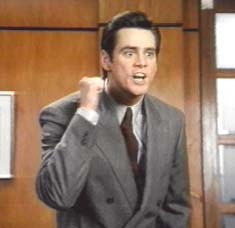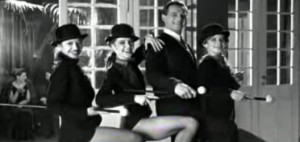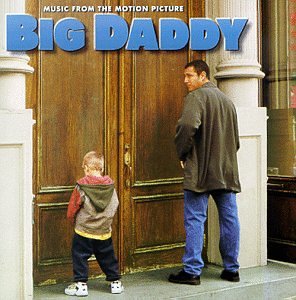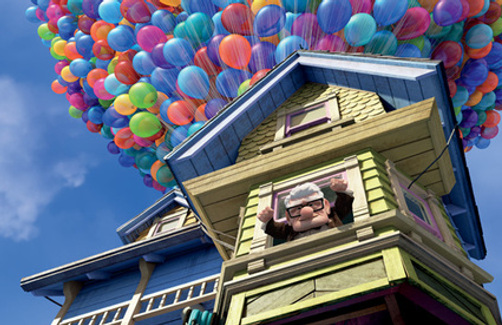Some of you might be wondering why I’m characterizing this value structure (nuclear family good, following your dreams bad) is an easy answer. Wouldn’t the easy answer be “do whatever you want, whenever you want?” But I have an axiomatic law for situations like this, which is “Disney’s Hook does not present us with profound moral truths.” It Maybe the word I’m looking for isn’t “easy” but familiar… either way, it makes it hard to claim that Up fills a crucial gap in the landscape of popular entertainment: it’s basically the same Spielbergian Idiot-Manchild-Learns-How-To-Be-A-Daddy plot that motivates, like, %60-%70 of all modern cinema, from Big Daddy to Ghostbusters 2 to Schindler’s List. You’ve seen this plot before, but I’ll give you a quick rundown:
Step 1 (optional): Man is totally focused on something “serious,” like his career.

This could be from, like, ten different Jim Carrey movies, but it's actually from Liar Liar.
Step 2: Man is in a state of childish regression, expressed by hedonism, wackyness, or outright childishness.

You thought I was kidding about Schindler's List, right?
Step 3: Father realizes that while work is too cold, and infantile hedonism is too hot, being a daddy is juuuuust right.

Given that acting like an idiot manchild is basically Adam Sandler's job, this image arguably fulfills all three steps at the same time.

One thing that doesn’t really come across in the article as written is that I loved, loved, LOVED this movie… I just found certin parts of it a little familiar.
There are some interesting points here, but I do not think that this is an indictment of those who do not have kids, in fact it is quite the opposite. Carl and Elle live a happy, meaningful life without kids. In fact, the central message that I took from the movie was a rejection of the Age-centered paradigm. Age does not equal wisdom, as Russell is in many ways ‘wiser’ than Carl.
If we look at this movie in that light, than what it seems to point out and attack is the general trend of the elderly to start thinking more of themselves. This is a natural transition; as friends and relatives leave (either moving away or being shuffled loose the mortal coil), people do not expand their social circle, they constrict it. Carl and Elle denied the Age-centered paradigm and their love sustained the kindness and warmth of their souls. Muntz took the opposite tack, and spurned society as a whole unless he could be seen as above it. However, to do so, he would need to follow only selfish desires and never think of others. The use of dogs as followers is telling here, as they blindly follow the Master. They themselves are very social, and have no comprehension of broader matters. Muntz cannot relate to them, nor they to him, and so this false society that he builds up for himself is a function of his selfishness, as it serves ONLY him.
By the end of the movie, we see that Carl, who was in danger of secluding himself. But, unlike Muntz (who is definitely the could-have-been-Carl), Carl finally understands that caring for others is just as important as caring for one’s self. Age does not matter, only companionship. Carl is an old man, but his soul is in some ways younger than Russell’s. The two bond not over typical father-son activities such as baseball or soap-box derbys, but over conversation and duty. In the end, even, as they eaat together; the relationship remains ambiguous. One could read this as a very fatherly thing to do, but it could also be read as Russell taking over the symbolic place of Carl’s wife. It may not be a romantic bond between them (I hope), but they do share a connection more akin to lovers than father/son. Russell is an equal, seen by his unwillingness to inherently trust Carl as an authority, but to confide in him emotionally and spiritually.
This is, admittedly, a very Freudian way of breaking down the movie, but there it is.
Great, great article, Jordan. It’s a very dark reading, but I think it gets at why I really didn’t like Up as much as I thought I would. I’ve never had any interest in having children, so the happy ending of, “See? Now Carl is complete because he has a son!” didn’t sit well with me. Especially because
a) I found Russell insufferably annoying, and
b) We was sitting in a movie theater with a dozen seven year old boys screaming through the whole movie behind us. We should get awards for not choking anyone.
Not to mention the other point you brought up about the freaking bird. What the hell is wrong with bringing the bird to the states? Yes, the bird has babies, I know. So bring the babies, too! If these animals are so rare, bring them to a zoo and try to breed more of them. For science! I can hear Indiana Jones right now: “Those birds belong in a museum!” Except replace museum with zoo.
The only part of your argument that I have some issue with is the idea that, by trying to achieve their childhood dream of visiting South America, Carl and Ellie are regressing. What if their childhood goal had been something more acceptable and “adult”, like becoming dentists? Would that be considered an act of regression? I do see your point about Carl’s visiting the place with a house full of balloons, though. That’s clearly an indicator of childish behavior.
@Mlawski – “What if their childhood dream had been something… like becoming dentists?” I think you’re arguing with the movie more than you’re arguing with me. I don’t see travelling to Venezuela as a particularly childish thing to do… but the house full of balloons, the piggy bank, and a few other aspects make me think that the movie is presenting it as childish.
And consider the other people that sought Muntz out over the years. I think that we’re told that one was a botanist and one was a surveyor, right? While these activities might be a little more adventurous than dentistry, they are still legitimate jobs — it’s not like they were searching for buried treasure or looking for a circus to run off with. But they’re still presented as childish, because they were all wearing those nifty helmet/goggle combos. And they still got their comuppance for daring to spend their time on something other than children.
@Stokes: You’re right. I AM arguing with the movie more than I’m arguing with you. Curse you, Up, and your rather conservative worldview!
Both this (awesome, albeit depressing, analysis) and the one by Fenzel (which was absolutely beautiful, by the way!) did something with regards to Muntz I feel the urge to point out, having *finally* seen _Up_ (and waited to read the articles, as such) today: Muntz says flat-out as he’s brandishing the sword, “I’ll take that bird back to the States- dead OR alive!” I’m already second-guessing and wondering if it’s “alive OR dead” instead, but regardless, all three words were indeed used. And I’m positive about their use (somehow, in some order) because of how much it shocked me, since he had sworn he’d bring it back ALIVE as he was leaving back in the day. After all, he had already brought back a dead one, and the scientists thought it was a fake. So why on earth would he change his mind? I noticed the jump and was jarred by it. I know that’s really nit-picky, but I think it changes why Muntz is bad, or at least makes him a bit worse. He’s a murderer of people, yeah, but then in his craze he renigs on the very purpose he murdered FOR by vowing to get the bird “dead or alive.” And note he assumed all of those people he had helmets from were there for his bird- he never said anything about them searching for him. And maybe they *were* looking for him, but he didn’t see it that way. They were after his precious (there’s another LotR parallel for ya). His possessiveness over it (demonstrated also in how his anger at Carl and Russel intensifies when he sees Kevin on the roof of the house- the house is Carl’s, not Muntz’s, so he feels usurped) drives him blindingly mad, to the point where it’s an, “If I can’t, no one will!” for him. He wants the bird to himself so much that he’s willing to kill it to prevent anyone else from taking credit for it. And, of course, it isn’t the bird itself so much as the prestige and societal acknowledgment embodied in the bird he craves. His self-imposed exile was the result of his arrogance- he thought he’d be able to find the bird quickly, or so it seemed, and he thus made his vow and set off. Then it became a matter of personal pride for him when he couldn’t catch it: but if HE couldn’t get the bird, nobody could. So he killed any competition and eventually was willing to kill the bird itself to stop anyone else from taking his (self-proclaimed) rightful place as its discoverer/society-revealer.
That was very ramble-tastic and no, it doesn’t relate all that much. My apologies.
I don’t have much substantive to add to this, but I do want to say that you (Stokes) and Fenzel, through your articles on this topic, have both done a tremendous job of opening my eyes to a lot of the subtext and details of this film, and I thank you for that.
Also, I’d like to point out that my Gravatar finally works. Huzzah!
Randomly, I decided to sit through the credits of this, more for the fact that I was sick and the tearing up during random sentimental bits of this movie had exacerbated my sickness to the point of not wanting to be alive, much less move,… anyhow, during the credit roll, there are several badges that roll by that are mind bogglingly strange, such as one with a nuclear symbol on it, and one of a mushroom cloud.
After all the nuclear family set talk in here, I couldn’t help but strikingly recall those weird badges rolling up the screen and I still wonder what the hell they were for, really.
@Sillyweasel: The badges corresponded somewhat thematically with the job title being credited. The person I was with and I remarked on it specifically, so I at least remember that much- but I don’t really remember what badge went where. The nuclear-looking one, for example, I think showed when an electrician or something similar was being credited… maybe… ?
I didn’t read all of the comments but I am against Stokes position on Muntz. Muntz’s life is sad because his life boils down to one thing one thing the longing for societal praise. It wasn’t enough for him to know that he was right and that the bird exist. All he needed to do was document the evidence and let the public decide for themselves. He didn’t care about the science otherwise he would’ve let all the explores that he killed help him. He cared about praise, thats why he has hundreds of dogs telling him how great he is.
Ellie passed on cause she knew what Carl didn’t and that life’s little things along with companionship is greater the one gigantic adventure.
He thought all the little things that he and Ellie did together wasn’t enough for HER. She had the idea of going to Paradise Falls when they were kids. So when he couldn’t give her what she wanted in adulthood (a baby), he decided to give Ellie her childhood back. Elllie deemed this as sweet but through all the flat tires and broken bones of adulthood you can’t buy your childhood back. When Ellie dies Carl doesn’t want to let go of anything he holds on to that house rather than help Russell out on knew adventures. However in the end he learns from his childhood hero that holding on to something for your own personal interest is not healthy it’s just sad. I don’t think the story is about people that choose not to children are wrong, I think the moral is a life without companionship and the exchanging of ideas well thats not worth it
An interesting dissection of the movie. I don’t know that I agree, because I think that Carl’s real problem was, as someone else has pointed out, that he had cut himself off from the rest of humanity in his grief at the loss of his wife. Here he was, surrounded by buildings with people and construction workers, but he is so wrapped up in his grief and his fear of losing the house (his tie with his wife) that he cannot connect with them. He’s afraid of going to the retirement home. Yet, if he hadn’t hatched his wild scheme, would going to a place where he might be forced to interact with others and break the shell he’d built around himself not actually be a good thing? There could easily be a story there. (I am thinking of some of the more serious moments of “Waiting for God” as an example.)
I would argue, as well, that, while there are father/son aspects of the Carl/Russell relationship, there’s also aspects of a more mature relationship of man-to-man. Both of them are wise in some aspects, foolish in others, and like friends, they compliment and help each other out. The importance at the end for me wasn’t that Carl was there instead of Russell’s dad. The dad could have been there. What was important was that he was there at all, with other people, not shut up in his house, clinging to his grief.